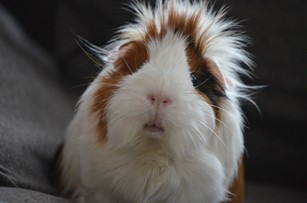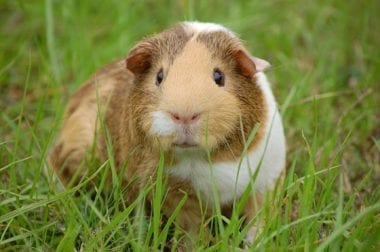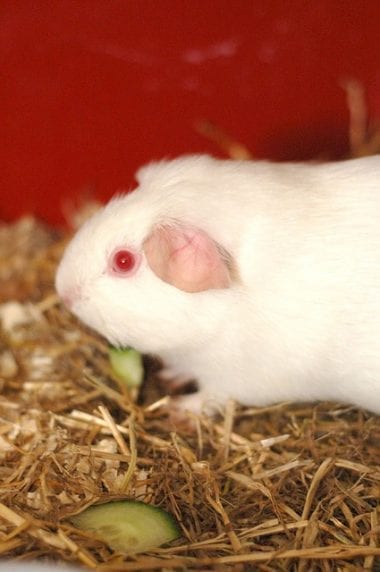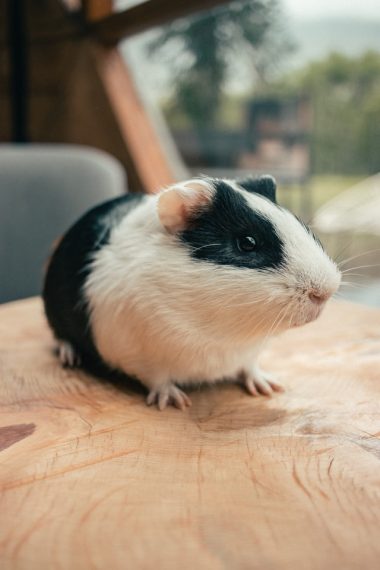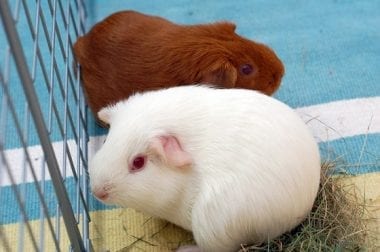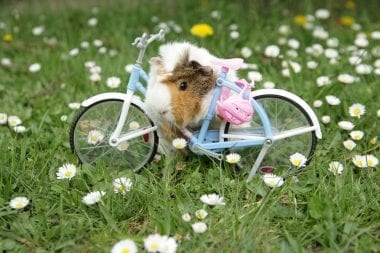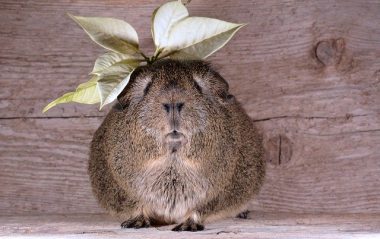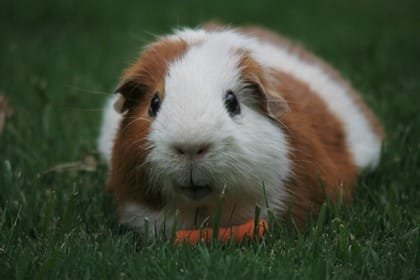
It is quite common for pet lovers to accidentally end up purchasing a pregnant guinea pig. It is not easy to detect pregnancy in a guinea pig since they have a pear-shaped body. But having to look after a pregnant guinea pig can be quite a scary task. Guinea pigs have a high mortality rate of around 20%. You are left wondering about how long your guinea pig will be pregnant and how to look after it. Pregnancy is a difficult and risky time for guinea pigs. During the pregnancy period, they need to be protected against complications and diseases like toxemia.
How long is a guinea pig pregnant?
Guinea pigs are pregnant for 58-73 days. The average gestation period is 65 days. The duration of pregnancy is inversely proportional to the litter size. Length of pregnancy for 1 litter can be 70 days while it reduces to 67 days for a litter of 6.
How to confirm your guinea pig’s pregnancy?
There may not be any visible physical signs of pregnancy in a guinea pig. If they are carrying tiny litters their belly may not enlarge significantly. If you look closely you may notice that the lower half of their belly appears firmer and rounded. Your guinea pig may consume more food and water due to her increasing energy needs. Guinea pigs have a tendency to avoid physical contact during pregnancy.
But if you suspect pregnancy in your guinea pig do not put pressure on the abdomen. Even the slightest pressure on the abdomen can cause miscarriage in a pregnant guinea pig. Take your guinea pig to the veterinarian who will be able to confirm a pregnancy. The vet may conduct an ultrasound test and also give you the estimated duration of her pregnancy. The ultrasound will also determine the number of pups and if any of them are dead. If needed your vet may refer you to someone who is specialized in exotic animal medicine and surgery including guinea pigs.
Risks during pregnancy period.
Your sow’s age is an important factor in the risks faced by your sow during pregnancy. Ideally, a sow should have her first pregnancy between the ages of 4-7 months. If it is her second pregnancy then she should be below 2 years of age.
Sows younger than the above-mentioned age groups are vulnerable to vitamin deficiencies during pregnancy. Your vet may prescribe an additional supplement in her diet. Older sows may require intervention since their pelvis can lose elasticity and in some cases may fuse.
If your sow is plump then she faces a high risk of toxemia. You cannot restrict her diet during pregnancy. But you will have to come up with an alternate diet plan in consultation with your vet. Calcium deficiency and pregnancy toxemia can be fatal for your sow during the pregnancy.
These problems surface during the last 7-10 days before birth. You will have to constantly monitor your sow for any decrease in food and water consumption, fatigue or drowsiness and any other symptoms of illness.
Determining the history of pregnancy.
It is a good idea to check the sow or boar’s breed as the pups of some breeds are more prone to genetic illness. Children of Dalmatian and Roan guinea pigs may inherit a lethal gene.
Caring for a Pregnant Guinea Pig.
Pregnancy is a distressing period for a guinea pig. You should shield her from stress as much as possible. The pregnant sow must be kept in a quiet place, away from noise or harsh lights. During the gestation period, you must reduce the handling of the sow to a minimum. Do not handle her in the last two weeks of pregnancy. Thoroughly check your sow’s coat, ears, eyes and nose twice a week during the pregnancy. Weigh her weekly to ensure that she is gaining weight steadily. Cut your sow’s hair short towards the end of the gestation period especially in the rear part. This is necessary as she will be unable to groom herself and the hair will turn dirty. Avoid a bath and other grooming activities during pregnancy. It will stress her out.
Feeding a pregnant Guinea Pig during pregnancy.
It is necessary to closely supervise your sow’s eating and drinking habits regularly every day during the length of her pregnancy. Inspect her every 3 to 4 hours and take a note of her food consumption. This will allow you to detect any illness promptly. If your sow stops eating and drinking during pregnancy then inform your vet immediately.
Give them extruded pellet feed but do not over-feed them. The packet will have feeding instructions. Give them high fiber foods. The growing fetus needs energy and this causes the sow to breakdown fats if she is not given adequate food. This causes metabolic problems. You must give the sow vitamin C supplements and calcium-rich food. Avoid multivitamin supplements as they can build up in the body. A portion of alfalfa hay daily will fulfil your sow’s calcium and protein requirements. Give your pregnant guinea pig fresh vegetables during her pregnancy. But make sure to rotate the vegetables daily to avoid mineral buildup present in a particular vegetable.
Increase the number of fruits in your sow’s diet during the last 4 weeks of pregnancy.
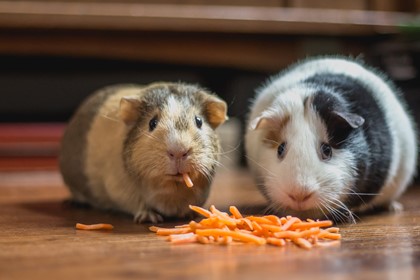
Provide your sow with clean water during the pregnancy period. Re-fill the water bottle daily and clean it weekly to avoid the growth of algae and bacteria in the water. Encourage your sow to move about. Regular activity is necessary to prevent obesity and have healthy blood flow.
Habitation during pregnancy.
Give a comfortable place to stay for your pregnant Guinea pig. Do not use multi-level cages for housing pregnant sow. They will face problems due to impaired balance. If you have a boar sharing the cage with your sow then remove it immediately to prevent an immediate second pregnancy. If there are other sows sharing the same cage then they can be retained provided all of them get along well. Layout 3 to 4 inches (ca. 10 cm) of soft fleece or grass hay on the floor of the cage. Making provision for a small box to hide in a corner of the hutch will act as a stress reliever for your pregnant sow.
It is necessary to clean the whole cage twice a week. Regular cleaning will prohibit any ammonia build-up from stale urine. Ammonia can leave the pregnant stow vulnerable to lung infections. If you see any soiled or wet patches in the cage then clean it immediately.
Getting ready for the due day.
Once your guinea pig completes her seventh week of pregnancy you will be able to notice the pups’ movement in her belly. If you feel a slight widening of her pelvic bones when you touch her underbelly its sign that the birth date is near.
You will have to make some preparations as the due date approaches. Guinea pigs are prone to birth difficulties. Some can give birth naturally while others may require veterinary assistance. Note down your vet’s emergency number and keep it handy. Discuss the possibilities of an out-of-hours birth and getting medical help. Keep a clean towel handy.
It is extremely difficult to predict the exact due date for guinea pigs. Your sow may give birth either before or after the date given by the vet. After your sow crosses 60 days of gestation check on her every 2-3 hours. If you are preoccupied then get your family or friends or a local breeder to keep an eye on your sow. The birthing process becomes safer if someone is around.
The birthing process.
Your guinea pig will let out a peculiar groan when she is about to go into labour. The whole process will be over within an hour. There will be a five-minute interval between the arrival of pups. Resist the temptation to hold the mother or touch the pups during the birthing process.
If there are any complications like the labor period crosses an hour or the mother foams at the mouth then contact your vet immediately. The mother straining for 15 minutes without producing a pup and excessive bleeding are some other signs of complications during birth.
After birth.
In rare cases when the pups come out too fast, the mother may not get time to break the amniotic sac. In such cases, you may have to pick up the pup and break the sac yourself. If any of the pups are not breathing gently lift them and massage their back. This will clear any blockages in its throat and help it to start breathing again. Your sow will consume the afterbirth and also clean all the pups. Once the entire birthing process is over you can remove any stained bedding from the cage. If the mother and pups are in good health it is best to leave them alone for a couple of hours.

